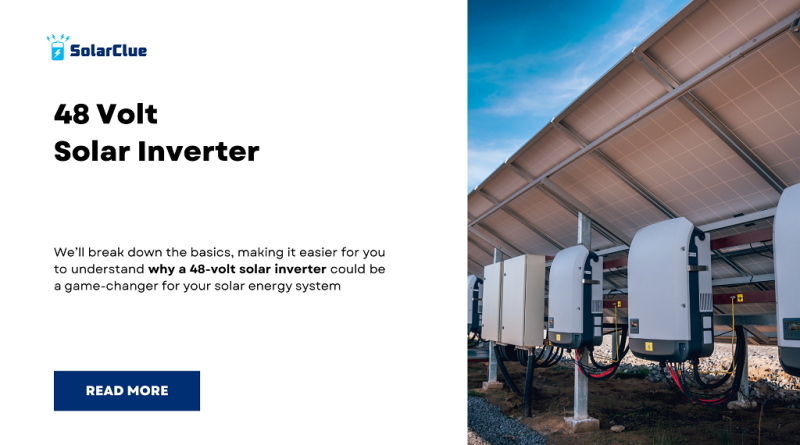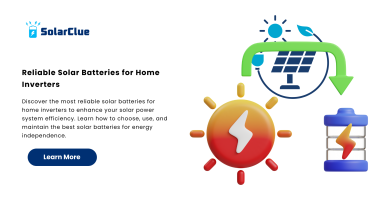48 Volt Solar Inverter
Solar energy is becoming more popular as a clean and sustainable power source. As more people shift toward solar solutions for their homes and businesses, the importance of selecting the right components for an efficient system can’t be overstated. One critical component is the 48-volt solar inverter. This blog will take a closer look at what it is, why it matters, and how it works in layman’s terms.
You might have heard of solar panels generating electricity from the sun, but have you ever wondered how that electricity becomes usable in your home? That’s where a solar inverter comes into play. Specifically, the 48-volt solar inverter is designed for larger solar power systems that need a more robust, reliable source of energy. Whether you want to power up your home, a small office, or even run a small industrial setup, this type of inverter can be the ideal solution.
But why choose a 48-volt inverter over other options like 12 or 24 volts? In this blog post, we’ll break down the basics, making it easier for you to understand why a 48-volt solar inverter could be a game-changer for your solar energy system. Let’s dive right in!
Table of Contents
What Is a Solar Inverter?
To understand a 48-volt solar inverter, it helps to first grasp what a solar inverter does in general. Solar panels generate electricity in the form of direct current (DC). However, your home appliances, lights, and most other electronics operate on alternating current (AC). The job of the solar inverter is to convert that DC electricity into AC electricity so it can be used in your home.
Solar inverters come in different voltage capacities like 12V, 24V, and 48V, each designed for different levels of power generation and usage.
Why Choose a 48-Volt Solar Inverter?
A 48-volt solar inverter is typically used for medium to large solar installations, which require a higher voltage to efficiently distribute power. Here’s why choosing a 48-volt system is often a good idea:
- Efficiency: A 48V inverter is more efficient in handling larger systems. It reduces the amount of current flowing through the wires, meaning less energy is lost as heat, and more of it gets used where it’s needed.
- Cost Savings: Because higher voltage systems are more efficient, they require fewer components like thicker wires or multiple smaller inverters. This can save you money on installation and maintenance in the long run.
- Supports Larger Battery Banks: If you’re thinking about adding energy storage to your system, such as a battery bank, a 48-volt system can support more storage capacity. This means more backup power for cloudy days or nighttime use.
- Safety: Higher voltage systems reduce the amount of current needed for the same amount of power, which minimizes risks like overheating and makes the entire system safer.
How Does a 48-Volt Solar Inverter Work?
A 48-volt solar inverter works by converting the DC electricity from the solar panels into AC electricity. Here’s a simple step-by-step breakdown:
- Solar Panels: These collect sunlight and convert it into DC electricity.
- Battery Bank (Optional): If you have a battery storage system, the DC electricity is sent to the battery for storage. The battery is typically set up to run on 48 volts for efficiency.
- Inverter: The 48-volt inverter converts the stored or live DC electricity from the panels or battery into AC electricity.
- AC Power: The inverter sends AC electricity into your home or business to power appliances, lights, and other electronics.
A key advantage of the 48-volt system is that it can handle larger solar setups, making it ideal for homes with higher energy needs or businesses looking to go green.
Advantages of a 48-Volt Solar Inverter
Now that you have a basic understanding of how a 48-volt solar inverter works, let’s take a look at its advantages:
| Advantage | Explanation |
|---|---|
| Higher Efficiency | Less energy loss due to lower current flow through wires. |
| Reduced Costs | Fewer components like wires and connectors are needed, lowering installation costs. |
| Better Performance | Handles larger energy demands, ideal for medium to large solar setups. |
| Scalable | Supports larger battery banks for energy storage, making it future-proof. |
| Safer | Higher voltage systems tend to be safer because they run cooler and are less likely to overheat. |
Types of 48-Volt Solar Inverters
There are different types of 48-volt solar inverters, each serving different needs:
- Pure Sine Wave Inverters: These provide cleaner, more reliable power, similar to what you get from the grid. They’re best for sensitive electronics like laptops and televisions.
- Modified Sine Wave Inverters: These are cheaper but may not be suitable for all types of electronics. They can cause buzzing sounds in some appliances or reduce their lifespan.
- Hybrid Inverters: A hybrid inverter not only converts DC to AC but also allows you to use both solar power and batteries for energy storage. It’s an excellent choice if you want to go fully off-grid or have backup power during outages.
How to Choose the Right 48-Volt Solar Inverter?
When choosing a 48-volt solar inverter, several factors should be considered:
- Power Rating: Ensure the inverter can handle the power needs of your home or business. This is usually measured in kilowatts (kW).
- Efficiency: Look for inverters with high-efficiency ratings to maximize your energy use.
- Compatibility: Make sure the inverter is compatible with your solar panels and battery bank.
- Warranty: A good inverter should come with a warranty of at least 5-10 years.
- Brand: Choose reliable brands with a history of good customer support and performance, like Luminous, SMA, or Growatt.
Installation of a 48-Volt Solar Inverter
The installation of a 48-volt solar inverter requires professional expertise, as it involves wiring, connecting the inverter to your solar panels, and setting up the battery bank (if applicable). A professional installer will ensure that everything is configured for optimal efficiency and safety. They will also help in securing the necessary permits and inspections required by local regulations.
Conclusion
In a nutshell, a 48-volt solar inverter is a smart choice for anyone looking to install a medium to large solar power system. It offers high efficiency, cost savings, scalability, and safety. If you’re considering going solar or upgrading your current system, investing in a 48-volt inverter could be the key to maximizing your energy production while keeping costs low.
Solar power is a long-term investment, and choosing the right inverter can make a significant difference in how well your system performs. Whether you’re powering a home, business, or even a small industrial setup, the 48-volt solar inverter provides a reliable solution that helps you get the most out of your solar panels.
Visit SolarClue® to see the best Solar Inverters. SolarClue® actively sells solar energy products at discounts of up to 50% on its online marketplace.
FAQ
1. What is the difference between a 12V, 24V, and 48V inverter?
The difference lies in the voltage capacity. A 48-volt inverter is more suitable for larger solar setups, while 12V and 24V inverters are better for smaller systems. A higher voltage system (like 48V) is more efficient and can handle larger loads.
2. Can I use a 48-volt inverter for a small solar system?
While you can technically use a 48-volt inverter, it may be overkill for small systems. A 12V or 24V inverter is usually more appropriate for smaller setups.
3. Is a 48-volt inverter suitable for off-grid systems?
Yes, a 48-volt inverter is excellent for off-grid systems, especially when paired with a battery storage solution. It provides more energy and can handle higher demands, which is essential for off-grid living.
4. How much does a 48-volt solar inverter cost?
The cost can vary depending on the brand, power rating, and features. On average, a good quality 48-volt inverter can range from $500 to $1,500 or more.
5. How do I maintain a 48-volt solar inverter?
Regularly check for dust or debris on the unit and keep it in a well-ventilated area. Also, have a professional inspect the system annually to ensure optimal performance.




